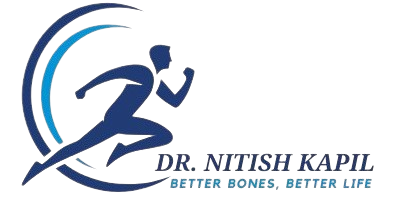
Book An Appointment
Frozen Shoulder
Frozen shoulder, also known as adhesive capsulitis, is a painful and debilitating condition that causes stiffness, pain, and limited movement in the shoulder joint. It occurs when the tissues around the shoulder capsule become thickened, inflamed, and tightened, leading to the restriction of movement. This condition typically develops gradually, often in three stages: freezing, frozen, and thawing. Each phase can last several months, making the recovery process prolonged and challenging.
The causes of frozen shoulder are not fully understood, but it often occurs after an injury or surgery that leads to immobilization of the shoulder for an extended period. It is also more common in individuals aged 40 and above, particularly women. Certain conditions such as diabetes, thyroid disorders, heart disease, and Parkinson’s disease are also linked to an increased risk of developing frozen shoulder. While frozen shoulder can be frustrating and painful, the condition is treatable with the right approach, and most individuals eventually recover full or near-full range of motion.
How Dr. Nitish Kapil Helps with Frozen Shoulder
Dr. Nitish Kapil is a highly skilled Orthopaedic surgeon with vast experience in diagnosing and treating shoulder-related conditions, including frozen shoulder. His expertise and patient-centric approach allow individuals to regain movement and relief from pain associated with this condition. Here’s how Dr. Nitish Kapil addresses the treatment of frozen shoulder:
Accurate Diagnosis
Dr. Nitish Kapil begins by conducting a thorough evaluation to understand the severity and stage of frozen shoulder. This includes a physical examination to assess the range of motion, followed by diagnostic imaging such as X-rays or MRIs to rule out other potential causes of shoulder pain.
Non-Surgical Treatments
For most cases of frozen shoulder, Dr. Nitish Kapil prefers non-surgical treatments to manage pain and restore movement. This typically involves a combination of anti-inflammatory medications, physical therapy, and corticosteroid injections. Physical therapy plays a crucial role in improving flexibility, reducing pain, and restoring shoulder mobility.
Arthroscopic Surgery
If conservative treatments do not provide adequate relief or if the condition persists for a long time, Dr. Nitish Kapil may recommend surgery. The most common procedure for frozen shoulder is arthroscopic release, in which small incisions are made to remove scar tissue and release the tight shoulder capsule. This helps restore movement and alleviate pain.
Rehabilitation
After surgical intervention, Dr. Nitish Kapil works closely with physiotherapists to design a personalized rehabilitation program. This program focuses on gentle exercises and stretches to gradually improve the range of motion and prevent further stiffness.
Ongoing Care and Monitoring
Dr. Nitish Kapil ensures continued support through follow-up visits to monitor progress and make adjustments to the treatment plan as necessary. His goal is to help individuals regain function and minimize discomfort throughout the healing process.
Through Dr. Nitish Kapil’s comprehensive approach, individuals with frozen shoulder can expect effective pain management and a gradual restoration of mobility, allowing them to return to normal activities and improve their quality of life.
Symptoms of Frozen Shoulder
- 1. Persistent shoulder pain, often worsening at night
- 2. Limited range of motion, making it difficult to lift the arm or reach overhead
- 3. Stiffness in the shoulder joint, often accompanied by discomfort when attempting to move it
- 4. Pain in the shoulder that can radiate down the arm
- 5. Difficulty performing daily tasks, such as dressing, brushing hair, or reaching behind the back
Solutions for Frozen Shoulder
Non-Surgical Management
Early stages of frozen shoulder can often be treated with physical therapy, nonsteroidal anti-inflammatory drugs (NSAIDs), and corticosteroid injections to manage pain and reduce inflammation.
Physical Therapy
A structured physical therapy program helps restore flexibility, strengthen shoulder muscles, and improve the overall range of motion in the joint. Regular stretching exercises and gradual mobilization are key to reducing stiffness.
Steroid Injections
Corticosteroid injections can help reduce inflammation and relieve pain, enabling individuals to perform exercises more effectively during physical therapy.
Surgical Intervention
In cases where conservative treatments fail, Dr. Nitish Kapil may recommend arthroscopic surgery. This minimally invasive procedure releases the tight shoulder capsule and removes any scar tissue, allowing for improved movement and pain relief.
Rehabilitation and Recovery
Post-treatment rehabilitation is vital for recovery. A combination of stretching, strengthening, and mobility exercises helps restore full shoulder function and prevent future stiffness.
Frozen shoulder can significantly affect daily life, but with the right treatment plan, it is possible to regain mobility and reduce pain. Dr. Nitish Kapil’s expertise in managing shoulder conditions ensures that individuals receive comprehensive care, whether through non-surgical approaches or surgical interventions. His goal is to provide lasting relief and improved shoulder function for all individuals suffering from frozen shoulder.




